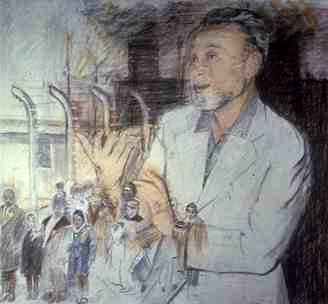We will have the thankless task of proving to a world which will refuse to listen, that we are Abel, the murdered brother.
– Ignasy Shiper (historian, killed at Majdanek in 1943)
 In his acclaimed book Survival in Auschwitz, Primo Levi recounts a recurring dream he and other inmates had in the Nazi death camp: that he returned home to his family and told them about it, but nobody listened. “The person standing in front of me doesn’t stay to hear, turns around and goes away,” he writes.
In his acclaimed book Survival in Auschwitz, Primo Levi recounts a recurring dream he and other inmates had in the Nazi death camp: that he returned home to his family and told them about it, but nobody listened. “The person standing in front of me doesn’t stay to hear, turns around and goes away,” he writes.
Levi’s nightmare became a reality for survivors in the immediate postwar years. Many made great efforts to bear witness to their ordeal under the Nazi yoke, to assure that the victims’ memory would not vanish into the abyss. They wrote testimonies, chronicles and other texts, many of which were never published. But few people were listening then. The meaning of the survivors’ testimony remained largely personal.
It was not until decades later that the witnesses were awarded a new social identity, that of survivors. They became the bearers of a singular and unique history – that of the Shoah – and also of fundamental moral and political lessons. They started talking to the media, in schools and at commemorative events. By sharing their stories they expanded their audience’s knowledge of the Holocaust but the primary functions of their testimony were to keep the Holocaust – not only the event in history, but also the potential for its repetition – before everyone’s eyes.
In a time when few eyewitnesses remain who were adults during the Holocaust, Primo Levi’s ghastly premonition could become an appalling reality again. As philospher Avishai Margalit has skillfully put it, the survivors have borne witness with the hope “that in another place or time there exists, or will exist, a moral community that will listen to their testimony.” The survivors of the Holocaust are leaving us, but their stories are preserved in oral history and video projects, museums, books, art and films. It is now our task as educators to ensure that new generations can become witnesses of the survivors’ historical experience and assume responsibility for the events that occur in the present. In other words, to remember the past but also to identify the warning signs and know when to react.
Alejandro Baer is the Stephen Feinstein Chair and Director of the Center for Holocaust and Genocide Studies. He joined the University of Minnesota in 2012 and is an Associate Professor of Sociology.

Comments